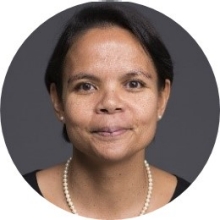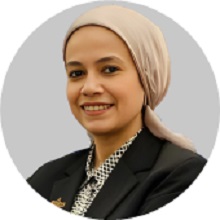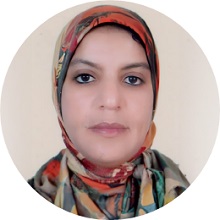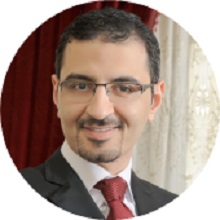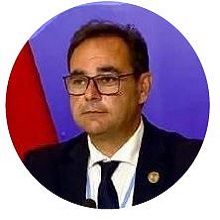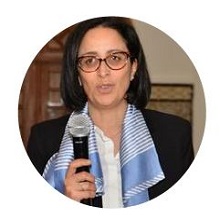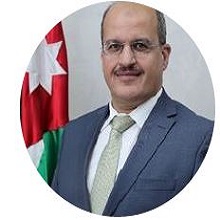Climate-smart Public Financial Management Middle East and North Africa (MENA) Conference
Climate-smart Public Financial Management Middle East and North Africa (MENA) Conference.
Read the proceedings of the Climate-smart Public Financial Management MENA Conference (pdf)
From February 26 to 29, 2024, over 200 participants gathered in Cairo to attend the regional Climate Smart Public Financial Management (PFM) Conference. The event aimed at bringing together Middle East and North Africa (MENA) countries. Leading international experts and World Bank staff working on climate smart and green public financial management facilitated the discussions and experience-sharing. Sessions focused on practical implementation of countries’ climate and green objectives in the budget process and other important components of the public financial management system. The regional conference hosted delegations from 16 MENA countries including representatives from Ministries of Finance, representatives from relevant sectoral ministries (i.e., Ministries of Planning, Environment or other) and government officials from Supreme Audit Authorities. The conference participants also included World Bank staff and partner organizations.
The main objectives of the regional conference were to:
1. Help finance specialists from Ministries of Finance in MENA countries to solidify an understanding of climate risks and green growth opportunities across government and the broader public sector, integrate climate and green objectives in government core processes and decision-making, and mainstream climate and green objectives in public financial management.
2. Facilitate the exchange of professional experience and knowledge transfer among PFM practitioners across MENA countries.
3. Discuss the Ministries of Finance's priorities, plans for moving forward, and relevant international experience related to climate action and green growth.
4. Strengthen government stakeholders' capacity to design and implement PFM reforms using the GovEnable participatory and iterative framework, aiming for concrete development results.
5. Support the country level efforts and facilitate collaboration across countries in MENA on mitigation and adaptation to climate change and application of international and regional best practices in integrating climate change objectives in public financial management through joint activities aiming to address the common issues.
- OVERVIEW
- REPLAY ALL THE EVENTS
- SPEAKERS
- RELATED
Group photo of the participants to the Climate-smart Public Financial Management Middle East and North Africa (MENA) Conference.
The Middle East and North Africa region faces multiple climate change challenges and tackling them will require from countries collaborative efforts across the whole of public sector supported by effective management of public finances. Key climate change challenges in the MENA region that have implications for public finance and call for the need to scale up by crowding in private sector and concessional financing include:
- Water Scarcity: The MENA region is one of the most water-stressed areas in the world. It already faces water scarcity due to limited freshwater resources, population growth, and agricultural demands. Climate change exacerbates this problem by altering rainfall patterns and accelerating evaporation, leading to decreased water availability and increased competition for water resources.
- Rising Temperatures: The MENA region experiences some of the highest temperatures globally, and climate change is expected to lead to further temperature increases. Extreme heat events can have severe impacts on human health, agriculture, and ecosystems, exacerbating existing vulnerabilities in the region.
- Sea-Level Rise: The MENA region has an extensive coastline, and many coastal cities and communities are vulnerable to rising sea levels. Sea-level rise can lead to coastal erosion, saltwater intrusion into freshwater sources, and increased risks of flooding and storm surges, threatening livelihoods and infrastructure.
- Desertification and Land Degradation: Climate change contributes to desertification and land degradation in the region, which negatively impacts agriculture and food security. Prolonged droughts and increasing temperatures can result in the expansion of arid areas, making land less suitable for cultivation.
- Energy Demands and Emissions: High temperatures drive up energy demands for cooling, which can strain electricity grids. The region's heavy reliance on fossil fuels for energy production also contributes to greenhouse gas emissions, further aggravating global climate change.
- Agriculture and Food Security: Climate change affects agricultural productivity and food security in the MENA region. Unpredictable rainfall patterns, increased droughts, and water scarcity can lead to crop failures and decreased agricultural yields.
- Biodiversity Loss: Climate change poses a threat to the region's unique biodiversity and ecosystems. It can disrupt natural habitats, alter migration patterns of animals, and put various plant and animal species at risk of extinction.
- Human Displacement and Migration: Climate-induced environmental changes, such as water scarcity and agricultural disruptions, can contribute to human displacement and migration within and across borders, leading to social and political challenges.
These challenges require urgent attention and concerted efforts to ensure sustainable development and mitigate the adverse effects of climate change. Advancement of climate smart and green policies is largely dependent on effective public institutions, particularly public finance, and management systems. Ministries of Finance in MENA countries play a crucial role in addressing these issues. By integrating climate considerations into fiscal policies, economic planning, and international cooperation, Ministries of Finance can drive the transition to low-carbon, climate-resilient economies, ultimately contributing to a more sustainable future for the region.
The conference is based on Helsinki Principles adopted by more than 70 countries- members of the Coalition of Finance Ministers for Climate Action. |
|
|---|---|
Principle 1 |
Align our policies and practices with the Paris Agreement commitments |
| Principle 2 | Share our experience and expertise with each other in order to provide mutual encouragement and promote collective understanding of policies and practices for climate action |
| Principle 3 | Work towards measures that result in effective carbon pricing |
| Principle 4 | Take climate change into account in macroeconomic policy, fiscal planning, budgeting, public investment management, and procurement practices |
| Principle 5 | Mobilize private sources of climate finance by facilitating investments and the development of a financial sector which support climate mitigation and adaptation |
| Principle 6 | Engage actively in the domestic preparation and implementation of Nationally Determined Contributions (NDCs) submitted under the Paris Agreement |
Ministries of Finance cannot act alone and should seek to promote a collaborative approach. Climate action is a story of structural transformation, investment, and innovation across all sectors. This demands strong cross-agency collaboration and integrating climate action into the decision-making of all government departments. While Ministries of Finance play a key role, Heads of State, Ministries of Planning, Environment, Energy, Transport, and many others have an equally critical part to play – and many ministries have been acting on climate for decades. Finance Ministries need to match this effort and enable and support the climate leadership of other actors, including through national budgets.
The budget cycle is an essential tool for the government to support the coordination and implementation of climate action. Understanding and agreeing on what climate action is needed and how and why it may be obstructed creates a platform to effectively drive climate action through the PFM system.
The conference agenda followed the budget cycle across five stages to consider key PFM elements that impact climate action, and possible functional change that might be required to bolster the PFM system for climate impact. At each point, the critical questions policy makers asked were around HOW to make the PFM system effective in facilitating climate action. The answers varied depending on national context and benefited greatly from consultation among stakeholders inside and outside of government. The conference agenda addressed the five stages of the budget cycle (below) to identify where challenges for climate action may emerge and offered examples of possible impacts and functional change required to address the challenge.
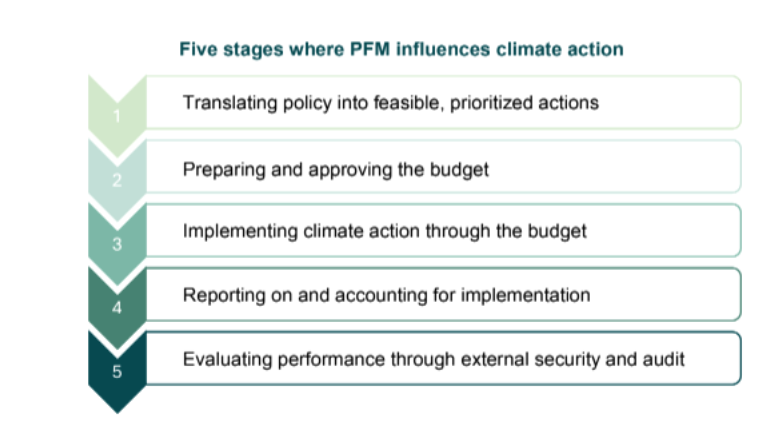
To make the conference useful and practical, participants shared the status of climate action in their country, highlighting the following:
• Is there a Climate Strategy and Action Plan? What are the main pillars of the strategy and targeted goals within five years?
• Is there a Climate Change Coordination Entity? What is the scope of its role?
• Work at the Ministry of Finance regarding integration of climate considerations in fiscal policies and the budget process.
CONFERENCE PROGRAM DAY 1 |
||||
9:00 - 9:30 am |
Opening remarks | View Event Proceedings
Jasmine Taha Zaki, Mistress of Ceremonies |
|||
1- Climate priorities in MENA countries Moderator: Richard Anthony Sutherland, Senior Governance Specialist and Program Manager of the Financial Management Umbrella Program, World Bank This session discusses climate priorities and national climate strategies and policies in MENA countries. To replay the entire opening remarks and session 1, click here. |
||||
9:30 - 9:45 am |
MENA Climate Change Challenges and Opportunities Syed Adeel Abbas, MENA Regional Coordinator for climate change, World Bank | View Presentation (pdf) |
|||
9:45 - 9:55 am |
Strengthening Institutions for Climate Change Laura Zoratto, Senior Economist, World Bank | View Presentation (pdf) |
|||
9:55 - 10:30 am |
Climate Priorities for Egypt, Jordan and Morocco (discussed by country representatives) Eng. Sherif Abdel Rahim Hosny, Head of Central Department for Climate Change, Ministry of Environment, Egypt | View Presentation (pdf) Manar Abu Hazim, Head of Emissions Reduction Department, Climate Change Directorate, Ministry of Environment, Kingdom of Jordan Representative from Morocco Conclusion by moderator |
|||
10:30 - 11-00 am |
Break |
|||
2- Roles of Finance and Planning in Climate Smart Policies Moderator: Mark Ahern, Program Leader and Lead Economist, Egypt, Yemen and Djibouti, World Bank This session will focus on levers that ministries of finance and planning have in coordinating economic, fiscal and financial policymaking to secure a sustainable and climate resilient future for their countries. |
||||
11:00 - 11:30 am |
Themes: Entry Points for Ministries of Finance and Planning in Climate Smart Policies Jens Kristensen, Practice Manager, Governance Global Practice, MENA, World Bank | View Presentation (pdf) |
|||
| 11:30 - 12:00 pm | Building Climate Finance: Initiatives by Egypt’s Ministry of Finance Sherine Hamed El Sharkawy, First Deputy Minister of Finance, Egypt |
|||
| 12:00 - 12:30 pm | Q&A |
|||
12:30 - 2:30 pm |
Lunch & Prayer |
|||
3 - Planning for Climate Action Moderator: Winston Cole, Lead Financial Management Specialist, World Bank This session discusses climate change risks and their implications and how government planning helps to accelerate climate action. |
||||
| 2:30 - 2:55 pm |
Climate Change Risks and Implications for Public Finances and Planning Speakers: Murray Petrie, International Expert on Climate and Green Fiscal Policy and Budgeting | View Presentation (pdf) |
|||
2:55 - 3:15 pm |
Egypt’s Vision 2030 – Strategic Planning for Climate Action Dr Mona Esam, Assistant Minister of Planning and Economic Development for Sustainable Development, Ministry of Planning and Economic Development, Egypt | View Presentation (pdf) |
|||
| 3:15 - 3:30 pm |
Towards Achieving Egypt’s Medium-Term Climate Goals – the Road Ahead Eng. Sherif Mohamed Abdel Rahim Hosny, Head of Central Department for Climate Change, Ministry of Environment, Egypt | View Presentation (pdf) |
|||
3:30 - 4:00 pm |
Discussion and Q&A |
|||
4:00 pm |
End of Day 1 |
|||
DAY 2 THEME: FINANCING CLIMATE ACTION AND IMPLEMENTATION |
||||
4 – Using the Budget to Drive Climate Action Moderator: Nataliya Biletska, Senior Public Sector Specialist, World Bank This session discusses how governments can drive climate action through fiscal policy and budgeting. |
||||
| 9:00 - 9:25 am (5 min) |
Climate Change Fiscal Policy and Macro Considerations Speakers: Zeljko Bogetic, Lead Economist, World Bank | View Presentation (pdf) |
|||
| 9:25 - 9:50 am (25 min) |
Climate Smart and Green Budgeting Murray Petrie, International Expert on Climate and Green Fiscal Policy and Budgeting | View Presentation (pdf) |
|||
| 9:50 - 10:10 am (20 min) |
Climate PEFA: From Diagnostics to Action Speaker: Holy Tiana Rame, Senior Governance Specialist,PEFA Secretariat | View Presentation (pdf) |
|||
| 10:10 - 10:45 am (35 min) |
Q&A |
|||
10:45 - 11:15 am |
Coffee break |
|
||
5 – Preparing a Plan to Drive Climate Action Facilitator: Tim Williamson, Senior Governance and Public Sector Specialist | View Presentation (pdf) This session introduces a framework followed by a group exercise to prepare and implement a plan to drive climate action. |
||||
| 11:15 - 12:45 pm (30 min) |
The Framework for Driving Climate Action Group Exercise
Report Back and Plenary Discussion Speakers: Tim Williamson, Senior Governance and Public Sector Specialist, World Bank Conference participants |
|||
12:45 - 2:30 pm |
Lunch & Prayer |
|||
6 - Climate Smart Investment Management Moderator: Laura Castro de Zoratto, Senior Economist, World Bank This session discusses a framework for climate smart public investment management, relevant country examples and how to make climate Public-Private Partnerships (PPP) happen. |
||||
| 2:30 - 3:00 pm (30 min) |
Climate Smart Public Investment Management and Asset Management Speaker: |
|||
3:00 - 3:30 pm
|
Crowding in Private Sector Investment in Climate Resilient Public Investments Speaker: Marcel van den Broek, Public Investment and PPP International Expert | View Presentation (pdf) |
|||
3:30 - 4:00 pm |
Q&A |
|||
4:00 pm |
End of Day 2 |
|
||
| 5:00 - 7:00 pm | Regional consultation: Reimagining Public Finance Twenty-five years after the publication of the field-defining Public Expenditure Management Handbook, The World Bank is embarked on a process to review, rethink and update approaches to public finance reform, learning lessons from past success and persistent challenges and responding to shifts in the broader context, including the climate crisis. This session will discuss the framework that is being designed, seek feedback from PFM practitioners in MENA, and set out the next steps “reimagining public finance.” Interactive Exercise on lessons learned in the past 25 years on what has worked and what has not worked with PFM Session moderated by Tim Williamson, Senior Governance and Public Sector Specialist, World Bank | View Presentation (pdf) |
|||
DAY 3 THEME: STATE-OWNED ENTERPRISES, PROCUREMENT OVERSIGHT AND CITIZEN PARTICIPATION |
||||
| 7 – Green and Resilient State-Owned Enterprises (SOEs) Moderator: Peter Ladegaard, Senior Public Sector Specialist, World Bank This session identifies the role of SOEs in climate change; discusses the tools to mobilize SOEs for climate change; and shows an example on how an SOE can practically deploy some of these tools. |
||||
| 9:00 - 9:50 am (50 min) |
The panel will discuss:
Speakers: Mr. Philippe Benoit, Research Director, Global Infrastructure Advisory Services 2050, and Adjunct Senior Research Scholar at the Center on Global Energy Policy at Columbia University SIPA. | View Presentation Mr. Jorge Galvezmendez, Policy Advisor at the Organization for Economic Co-operation and Development (OECD) | View Presentation Mr. Naoufal Mahdar, Vice-President of Climate Action & Decarbonisation, Office Chérifien des Phosphates (OCP), Morocco. | View Presentation (pdf) |
|||
| 9:50 - 10:00 am (10 min) |
Q&A |
|||
8 – Panel discussion: The Power of Green Public Procurement (GGP) for Climate Action This session discusses GGP and integrating environmental and sustainability factors into public procurement decisions. Moderator: Majed M. El-Bayya, Practice Manager, MENA Governance - Procurement, World Bank. |
||||
| 10:00 - 10:15 am (15 min) |
Driving Sustainability: World Bank's Green Public Procurement Roadmap for MENA (Presentation) Speaker: Jocelyne Jabbour, Procurement Specialist, World Bank | View Presentation (pdf) Yolanda Saito, Chief Operating Officer, IMPACTI | View Presentation (pdf) |
|||
| 10:15 - 11:00 am (45 min) |
Panel discussion MENA Experience in Green Public Procurement—Emerging Pathways in Jordan, Morocco, and Tunisia’s Journey Speakers: Eng. Mahmoud Khliefat, Director General, General Tenders Department, Kingdom of Jordan | View Presentation (pdf) Fatiha Moutchou, Head of Service, International Cooperation in Public Procurement, General Treasury, Kingdom of Morocco | View Presentation (pdf) Rim Zehri, General Controller of Public Procurement, President of the National Observatory of Public Procurement, High Authority of Public Procurement, Tunisia | View Presentation (pdf) Conclusion by Moderator |
|||
11:00 - 11:30 am |
Break |
|
||
9 – Sustainability Reporting, Assurance and Accountability of Climate Action Moderator: Mona El-Chami, Senior Governance Specialist, World Bank This session discusses climate-responsive accounting, sustainability reporting, assurance, and accountability in the public sector. |
||||
| 11:30 - 12:10 pm (40 min) |
The role of Accountants and Auditors in Climate Change Action and skills needed Public Sector Sustainability Reporting and Climate Related Disclosure Public Sector Sustainability and Assurance Report Environmental Accounting and Auditing Implementation of Climate Policies Speakers: Ms. Asmaa Resmouki, President, International Federation of Accountants (IFAC) Mr. Mark Johnson, Senior Subject Manager - Public Sector, Association of Chartered Certified Accountants (ACCA) Mr. Ross Smith, Program and Technical Director, International Public Sector Accounting Standards Board (IPSASB) | View Presentation (pdf) Dr. Vivi Niemenmaa, Secretary General, INTOSAI Working Group on Environment Audit (INTOSAI WGEA) |
|||
| 12:10 - 12:30 pm (30 min) |
Q&A |
|||
1:00 - 2:30 pm |
Lunch & Prayer |
|||
THEME: CITIZEN ENGAGEMENT/CIVIC TECH IN ADDRESSING CLIMATE CHANGE |
||||
10 – Public Participation, Civic Tech, and Climate Moderator: Stephen R. Davenport, Senior Governance Specialist and Global Lead, World Bank This session explores how civic tech solutions can advance climate adaptation, mitigation, and emergency response. |
||||
| 2:30 - 2:40 pm (10 min) |
Climate Change and CivicTech Speaker: Stephen R. Davenport, Senior Governance Specialist and Global Lead, World Bank |
|||
2:40 - 3:20 pm |
Panel Discussion CivicTech Solutions for Climate Change and the Role of Government, Private Sector and Civil Society Stakeholders Speakers: Lauren Kahn, Director, Public Digital, UK | View Presentation (pdf) James Stewart, CTO, Public Digital, UK Fadia Elgharib, Community Manager, Global Innovation Gathering, Egypt/Germany View Presentation (pdf) Lamiaa Nail, Manager, San3a Tech, Egypt | View Presentation (pdf) |
|||
| 3:20 - 3:30 pm (10 min) |
Q&A |
|||
Workshop Closing |
||||
| 3:30 - 3:45 pm (15 min) |
Concluding remarks Speakers: Jens Kristensen, Practice Manager, MENA Governance, World Bank Representative from the Ministry of Finance, Arab Republic of Egypt |
|||
3:45 pm |
End of Day 3 |
|||
DAY 4: FIELD TRIP ORGANIZED BY EGYPT MINISTRY OF FINANCE |
||||
Speakers
Date: February 26 - 29, 2024 ET
Location: Cairo, Egypt





